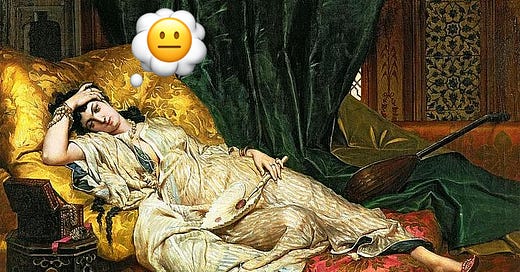This week, a special report from the etymological frontier via my wife Sarah Lazarovic:
“It wasn’t burnout — we still had energy. It wasn’t depression — we didn’t feel hopeless. We just felt somewhat joyless and aimless. It turns out there’s a name for that: languishing.” — Adam Grant, The New York Times, April 2021
It wasn’t abject misery — we still took modest pleasure in things like Ted Lasso and cheese puffs. It wasn’t COVID — we never left our house. It was something akin to being hungover on coconut wine coolers for the better part of a year. And there was a word for it: daydrinking.
We didn’t feel very happy or very sad, we didn’t have enough energy for either. But we didn’t quite want to die. Instead, we wanted to lie down on the cold kitchen tiles and listen to Spotify playlists with names like Nu Chill. Turns out, there was a term for this condition — floorishing.
It was like being blindfolded and turned around a dozen times and then put behind the wheel of an automobile while dressed as a clown and eating copious amounts of frozen yogurt, so intense was this volatility of emotion that had reigned over us throughout this past year. The name for this feeling: froyobozoing.
There was a word for this condition, a desire to do nothing but drink wine out of sinuously-shaped carafes while sitting naked in the sun on our roof, ignoring the torrent of death notices and Matt Gaetz stories. We called it: aerating.
Was it all the reading about COVID we were doing that accounted for this deep foundational knowledge of CDC guidelines that made us a professional expert in everything, eager to share our hard-won insights with our social media friends? Of course. This feeling? Probloviating.
It wasn’t pescetarianism so much as a physical desire to eat exclusively lobster, while dramatically moping for days on end. Yes, there was a name for this malady: langousting.
Do you feel a mindless sense of happiness because your life is absolutely unchanged, though if anything your fortunes have improved dramatically while your skin is looking better than ever? It’s a thing, and there’s a name for it: onepercenting.
Is there only one human we believe to be truly good, after this wretched, wretched year, and is it all we can do to elevate her beauteous voice and scientific munificence, while forgiving all the other stupid, craven humans in the world? Yes, this feeling is real, and clinically valid. It’s called Partoning.
It wasn’t depression — we had medication. It wasn’t joy — we weren’t nuts. It was something in between, and there was a name for it: existing.
Quick quips; lightning
“A bore is a man who, when you ask him how he is, tells you.”
— Bert Leston Taylor
“Life, friends, is boring. We must not say so.”
— John Berryman
“What would life be without coffee? But, then, what is life even with coffee?”
— King Louis XV of France
Better languishing through chemistry
Let’s imagine you’re on the cusp of some quality languishing but you just can’t seem to get there. Well, you may need medical help, and there is no greater guide in modern literature than Dr. Tuttle, the physician who sets the pharmaceutical stage in Ottessa Moshfegh’s 2019 novel My Year of Rest and Relaxation.
Dr. Tuttle, an eccentric psychiatrist picked at random from the phone book, offers some passing advice on non-prescription interventions:
“Daily meditation has been shown to cure insomnia in rats. I’m not a religious person, but you could try visiting a church or synagogue to ask for advice on inner peace. The Quakers seem like reasonable people. But be wary of cults. They’re often just traps to enslave young women.”
But her true gift is in dispensing drugs.
“I don’t care what the FDA has to say: a nightmare is just an invitation to rewire your neurocircuits.”
With Dr. Tuttle’s help, our narrator is able to well and truly languish, spending a whole year in a near-catatonic state. Hopefully it’s too late in your personal pandemic to consider this, but just in case:
“The sample I gave you was the children’s dosage. That would only muddy up the waters, so to speak. The brain must cross a certain threshold before it can function abnormally. It’s like filling a bathtub. It means nothing to your downstairs neighbors until it’s overflowing.”
The painting at the top of Get Wit Quick No. 96 is Hippolyte Berteaux’s Odalisque with a Lute. It marks Mr. Berteaux’s first appearance in this newsletter. My book Elements of Wit: Mastering The Art of Being Interesting fills the mental bathtub and then some. If you don’t quite feel like forwarding this email to everyone you know BUT you also don’t really want to unsubscribe, smash your iPhone with a ball peen hammer, and bury yourself with its remains in the park, why not just tap the ❤️ below?







Again, Spot On. Appreciate the wit!
Really great! Cheese puffs are getting me through